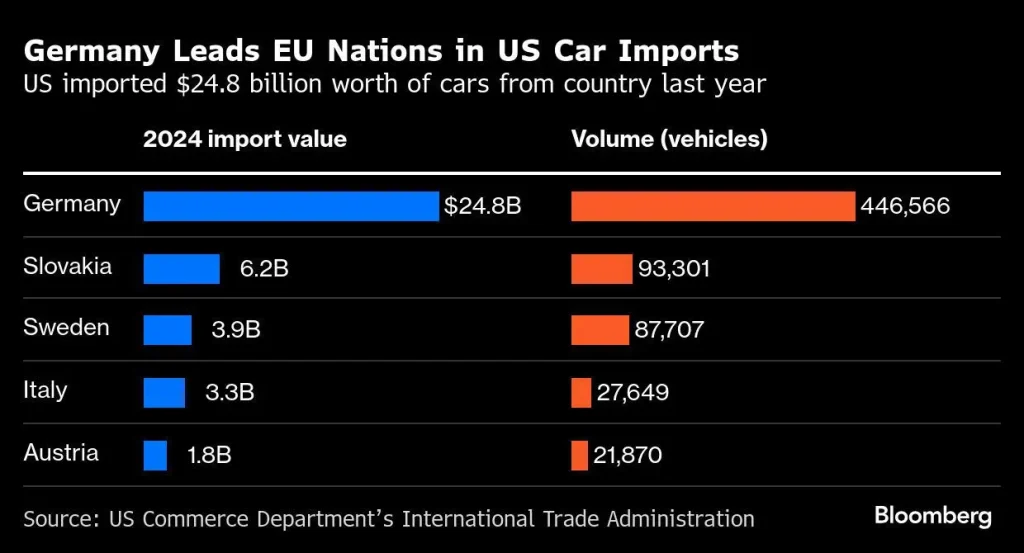The impact of Mercedes Porsche tariffs is reshaping the landscape of luxury car sales, particularly for renowned German manufacturers like Mercedes-Benz and Porsche. These companies have been significantly affected by U.S. tariffs that have led to steep declines in both revenue and sales. As reported, Mercedes-Benz anticipates a substantial drop in its earnings for 2025 while Porsche has adjusted its forecasts multiple times this year due to the pressures of tariff costs and intense market competition. In the context of the shrinking China car market, these hurdles pose serious challenges, forcing both automakers to reconsider their strategies amid changing regulatory environments. Navigating through these dynamics will be crucial for maintaining their standings in the luxury automotive sector.
The repercussions of tariffs on Mercedes and Porsche highlight a broader crisis within the luxury automotive industry facing external economic pressures. German luxury car makers are grappling with increasing costs due to duties imposed on imports, which has forced them to revise their financial outlooks drastically. Given the lagging sales numbers in both the U.S. and significant markets like China, these automakers are re-evaluating their operational strategies to adapt to the turbulent trade climate. The continuing scrutiny surrounding luxury car pricing and market positioning reflects a shift in consumer sentiment that could redefine the future success of brands like Mercedes-Benz and Porsche. Consequently, understanding the financial ramifications of these trade policies is essential for stakeholders in the auto industry.
The Impact of U.S. Tariffs on Luxury Car Sales
The introduction of U.S. tariffs on imported vehicles has had a profound effect on luxury car manufacturers, particularly on brands like Mercedes-Benz and Porsche. The imposed tariffs, which reached as high as 27.5 percent during the second quarter, have made U.S. consumers more hesitant to purchase high-end vehicles. This has been evidenced by a notable 6 percent drop in Mercedes-Benz sales in the first half of the year. Such declines directly impact the revenue streams of these automakers, forcing them to rethink their sales strategies and adjust their earnings forecasts.
Additionally, the luxury car market in the U.S. has faced significant disruptions, not only from tariffs but also from an overall economic slowdown. The combination of these factors has resulted in decreased consumer confidence, leading to further declines in sales. As Mercedes and Porsche navigate these challenges, they are likely seeking new approaches to maintain their market presence while mitigating the adverse effects of tariffs.
Mercedes and Porsche’s Adjustments Amidst Economic Pressures
In light of the current economic landscape, both Mercedes and Porsche have substantially revised their earnings forecasts for the year. Mercedes has indicated that its revenues will be “significantly below” previous estimates, primarily due to lost sales tied directly to the tariff policies in place. The company reported a staggering profit drop of over 50%, underscoring the critical financial implications of the U.S. tariffs and simultaneously struggling sales in China.
Porsche, likewise, has felt the sting of these economic pressures. With its earnings outlook adjusted for the third time this year, the luxury carmaker faces unique vulnerabilities as all vehicles are produced in Europe. As America becomes a battleground for tariffs, Porsche’s strategies may involve recalibrating their supply chains and looking toward future trade agreements that can offer relief from these financial burdens.
Chinese Market Slowdown Affects Sales
The luxury car market has not only been affected by U.S. tariffs but also by a significant slowdown in demand in China. This Asian market, once a booming hub for luxury car sales, has seen Porsche’s deliveries dip nearly 30%. The reasons for this downturn include increasing competition and a shift in consumer preferences, which have made maintaining previous sales volumes increasingly difficult for luxury brands.
Both Mercedes and Porsche are adapting their strategies to address these challenges, but the reality remains harsh. The trade framework and competitive pressures within China necessitate critical adjustments to maintain brand allure and market share. With these challenges, the Chinese car market’s dynamics could redefine how luxury automakers strategize for the future.
Forecasts for 2025: Challenges Ahead for Mercedes-Benz and Porsche
Looking ahead to 2025, the financial outlook for both Mercedes-Benz and Porsche is cautious. The combination of U.S. tariffs and declining demand in key markets such as China suggests that both companies may face continued challenges in boosting their sales numbers. Analysts predict that adjusting to these market conditions could involve not only cost-cutting measures but also innovative marketing strategies aimed at regaining consumer confidence in luxury products.
Moreover, the anticipated prospects for Porsche earnings forecasts indicate a trend of further declines if current market conditions persist. The overarching question remains: how will these companies recalibrate their operations to navigate through the challenging waters of 2025? Their ability to enhance supply chain efficiencies and respond to consumer behavior changes will be pivotal in determining their sustainable growth in the luxury market.
The U.S.-EU Trade Agreement: What It Means for Mercedes and Porsche
The recent trade agreement between the U.S. and the European Union, aimed at reducing tariffs on imported vehicles from 27.5% to 15%, presents a glimmer of hope for luxury automakers like Mercedes and Porsche. This agreement is expected to alleviate some financial pressures, potentially improving sales prospects in the U.S. market. Mercedes, particularly, could benefit from this arrangement as it exports American-made SUVs to Europe, where previously imposed tariffs have hindered profitability.
However, while this trade deal may offer some relief on tariffs, it does not wholly shield these companies from the broader effects they face with fluctuating markets and production costs. Executives from both companies express cautious optimism, emphasizing that while some aspects of the agreement will help their bottom lines, the overall landscape requires vigilance and strategic adaptation.
Navigating the Competitive Landscape in Luxury Cars
As luxury car manufacturers like Mercedes and Porsche grapple with tariffs and market slowdowns, they must also contend with an increasingly competitive landscape in both the U.S. and China. The intense competition from emerging luxury brands and the growing electric vehicle segment poses significant threats. Understanding consumer trends and adapting to new automotive technologies are crucial for maintaining their status in a crowded market.
To navigate this competitive era, both brands must innovate in their offerings and marketing. Establishing a compelling brand narrative, highlighting technological advancements, and enhancing customer experiences are vital strategies for standing out in a market that is rapidly evolving. As they position themselves to compete effectively, responses to tariffs and economic trends will shape their long-term strategies.
Future Prospects for German Automakers: Learning from Setbacks
The forecasts for Mercedes and Porsche following their current setbacks provide a learning opportunity for German automakers. There is an increasing need for resilience and adaptability in the face of trade wars and economic fluctuations. Companies must examine their dependencies on specific markets and identify potential risks that could exacerbate existing vulnerabilities in times of uncertainty.
As they learn from their experiences in 2025, a focus on diversified market strategies, improving supply chain logistics, and investing in electric vehicle technology may open new avenues for growth. The ability to pivot and embrace change could ultimately determine whether these luxury brands maintain their prestige or fall victim to the challenges they face in the global auto industry.
The Role of Innovation in Overcoming Tariff Challenges
Innovation plays a critical role in helping Mercedes and Porsche overcome the challenges posed by tariffs and market slowdowns. As tariffs impact pricing strategies and consumer affordability, luxury automakers must invest in innovative technologies that not only improve vehicle performance but also appeal to environmentally conscious customers. This shift toward sustainable luxury vehicles could help them regain lost sales and capture new demographics.
Furthermore, by focusing on innovation in marketing and customer engagement—such as enhanced online purchasing experiences and digital showrooms—these brands can redefine how they connect with consumers. Understanding shifting sentiment towards luxury and creating unique value propositions can help counteract the adverse effects of U.S. tariffs and a turbulent global market.
Strategic Partnerships and Alliances in the Luxury Car Market
In a time of uncertainty driven by tariffs and economic disruptions, strategic partnerships and alliances can be vital for luxury automakers like Mercedes and Porsche. Collaborating with tech firms and other automakers can yield advancements in electric vehicle technology or enhance supply chain efficiencies. By forging strong alliances, both companies could leverage mutual strengths to enhance competitiveness against emerging players in the luxury market.
Additionally, these partnerships may offer a path toward shared resources in research and development, mitigating costs while accelerating innovation. As the landscape of the automotive industry evolves, strategic alliances could be the key to overcoming current challenges and ensuring a sustainable competitive advantage in the luxury market.
Frequently Asked Questions
How are U.S. tariffs affecting Mercedes-Benz revenue?
U.S. tariffs have significantly impacted Mercedes-Benz revenue, leading to a reported decline of 6 percent in U.S. sales during the first half of 2025. The tariffs have forced the automaker to adjust its earnings forecasts downward and revise its profit margin expectations due to increased import costs.
What is the forecast for Porsche earnings in light of U.S. tariffs?
Porsche has reduced its earnings forecast multiple times in 2025, primarily due to the negative effects of U.S. tariffs, which have added approximately 400 million euros in costs. This has led to a staggering 66% drop in profits in the first half of the year.
How are luxury car sales for Mercedes and Porsche being impacted by the slowdown in the China car market?
Both Mercedes and Porsche are experiencing a decline in luxury car sales, with Mercedes reporting a 14% drop and Porsche facing a nearly 30% decrease in deliveries in China. This slowdown is attributed to intense competition and shifting consumer demand, compounded by high tariff costs.
What strategic changes are Mercedes and Porsche making due to the impact of U.S. tariffs?
In response to the effects of U.S. tariffs, Mercedes and Porsche are adjusting their production and sales strategies. For Mercedes, the elimination of E.U. tariffs on American-made vehicles may provide some relief, while Porsche is focusing on stabilizing prices in North America to counteract tariff pressures, despite facing declining sales in China.
What role do U.S. tariffs play in the competitive landscape for Mercedes and Porsche in the China car market?
U.S. tariffs have intensified competition for Mercedes and Porsche in the China car market, as both companies struggle to maintain their market positions amidst rising costs and decreasing demand. Their vulnerability to tariffs hampers profitability and market share, particularly against local competitors.
Are there any potential benefits for Mercedes from the new U.S.-E.U. trade agreement regarding tariffs?
Yes, the new U.S.-E.U. trade agreement, which lowers tariffs on imported cars to 15%, could benefit Mercedes-Benz. The company manufactures popular SUVs in Alabama, and the elimination of tariffs for U.S.-made vehicles shipped to Europe may enhance their competitiveness in the European market.
What are the long-term implications for Mercedes and Porsche of the ongoing tariff discussions?
The long-term implications of ongoing tariff discussions for Mercedes and Porsche include potential shifts in pricing strategies, supply chain adjustments, and changes in production locations to mitigate costs. Both companies must navigate an evolving trade environment to protect their profitability and market presence.
| Key Point | Impact on Mercedes-Benz | Impact on Porsche |
|---|---|---|
| U.S. Tariffs on Imports | Sales declined by 6% in the U.S. in the first half of the year. Revenue expected to be significantly below last year. | Profit dropped by 66%. Facing high tariff costs amounting to approximately 400 million euros ($462 million). |
| Slowdown in China | 14% decline in sales. China accounts for a third of total sales, intensifying the impact of tariffs. | Sales in China dropped nearly 30%. The brand faces increased competition and a stark decrease in demand. |
| EU-U.S. Trade Agreement | The elimination of EU tariffs on U.S.-made cars may benefit Mercedes by improving competitiveness for those exports. | Limited benefit as all vehicles are produced in Europe and tariffs remain high. |
Summary
The impact of Mercedes Porsche tariffs has triggered significant changes in sales and profits for both manufacturers, primarily due to U.S. tariffs and a slowdown in demand from China. Both companies have reduced earnings forecasts and restructuring strategies to cope with diminished market performance. Looking forward, addressing these challenges while leveraging new trade agreements will be crucial for recovery.



